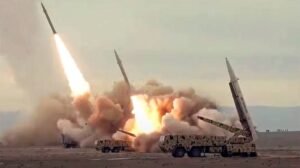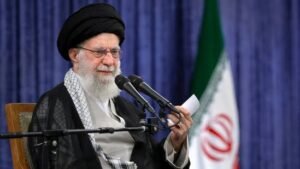Worldwide leaders welcome Saudi-Iran agreement to resume diplomatic relations

Worldwide leaders have welcomed the announcement that Saudi Arabia and Iran have reached an agreement to resume diplomatic relations.
The decision to re-establish relations, which were severed in 2016, came following talks that took place from March 6 through March 10 in Beijing.
The announcement, which was made on Friday in a joint statement with China, has been welcomed across the globe as a victory for peace and dialogue, state news agency SPA reported.
United Nations Secretary-General Antonio Guterres welcomed the agreement while United Nations spokesperson Stéphane Dujarric expressed the gratitude of the UN Secretary-General to China for hosting the recent talks.
Guterres also welcomed the efforts of other countries in this regard, especially those of Oman and Iraq.
The French foreign ministry also said in a statement that Foreign Minister Catherine Colonna supports dialogue and any initiative that can make a tangible contribution to calming tensions and strengthening regional security and stability.
The Hashmite Kingdom of Jordan on Friday welcomed the trilateral statement issued by the Kingdom of Saudi Arabia, Iran, and China on resuming diplomatic relations, with the Ministry of Foreign Affairs and Expatriates in Amman expressing hope that this agreement would contribute to enhancing security and stability in the region, in a way that preserves the sovereignty of states while avoiding interference in their internal affairs, and serves common interests.
Pakistan said that it firmly believes that this important diplomatic breakthrough will contribute to peace and stability in the region and beyond.
In a statement, Pakistan said: “We commend the role played by China’s visionary leadership in coordinating this historic agreement which reflects the power of constructive engagement and meaningful dialogue. We laud [the] sagacious leadership of the Kingdom of Saudi Arabia and the Islamic Republic of Iran for this very positive development,”
The statement also affirmed, “Pakistan will continue to play a constructive role in the Middle East and the region. We hope this positive step would be a role model for regional cooperation and harmony.”
The Kuwaiti Ministry of Foreign Affairs also commended the initiative of the friendly President of the People’s Republic of China Xi Jinping to host the Saudi-Iranian bilateral talks and affirmed Kuwait’s support for this agreement, hoping that it would contribute to strengthening the pillars of security and stability in the region, and build trust and develop friendly relations between both countries in a way that serves the interest of the countries of the region and the whole world.
The Kingdom of Bahrain also welcomed the agreement. In a statement, the Ministry of Foreign Affairs expressed Bahrain’s appreciation for the initiative of the People’s Republic of China to host the Saudi-Iranian talks, hailing earlier Iraqi and Omani diplomatic efforts in this regard.
The ministry also expressed hope that this agreement would constitute a positive step on the road to resolving differences and ending all regional conflicts through dialogue and diplomatic means, and establishing relations on the basis of mutual understanding, respect, good neighborliness, non-interference in the affairs of other countries, and adherence to the charters of the United Nations, the Organization of Islamic Cooperation, and international laws and norms.
It praised the leading role of Saudi Arabia in supporting security, peace, and stability, as well as in pursuing diplomacy in settling regional and international disputes.
United Arab Emirates Foreign Minister Sheikh Abdullah bin Zayed also welcomed the agreement on Saturday, saying on Twitter it was an “important step toward stability and prosperity” in the region.
The Ministry of Foreign Affairs of the Republic of Turkey also welcomed the agreement.
In a statement, it congratulated the two countries on the agreement, which it said contributes significantly to laying the foundations for security in the region.
A spokesperson for the Iraqi Ministry of Foreign Affairs, Ahmed al-Sahhaf, confirmed that the agreement between the Kingdom of Saudi Arabia and Iran to resume diplomatic relations between them will create a new atmosphere in promoting the interests of the region.
In a statement, the ministry spokesperson said that the Saudi-Iranian agreement comes as a culmination of the two sides’ vision of the priority of dialogue as a way to reduce tension, indicating that the agreement inaugurates a new phase of collective opportunities.
He explained that Iraq’s hosting of the dialogue rounds between the Kingdom and Iran came with the aim of the region’s need to achieve the desired integration at all levels, stressing the need to create a safe region and an environment that enhances development opportunities according to a collective will that transcends differences.
The Muslim World League (MWL) also welcomed the agreement reached between the Kingdom of Saudi Arabia and the Islamic Republic of Iran to resume diplomatic relations and re-open their embassies and missions.
In a statement issued by the MWL’s General Secretariat, MWL Secretary-General Sheikh Dr. Mohammed bin Abdul Kareem al-Issa expressed hope that this agreement would benefit the two fraternal countries and peoples, and that it would promote regional and international stability and prosperity.
In a statement, the Secretariat-General of the Organization of the Islamic Cooperation (OIC) also welcomed the two countries’ affirmation of the respect for the sovereignty of states, the non-interference in internal affairs of states, and their willingness to resolve disputes through diplomacy and dialogue.
OIC Secretary General Hissein Brahim Taha expressed hope that the agreement would contribute to enhancing regional security and stability and enhance cooperation among the Jeddah-based organization’s member states.
For its part, Syria on Saturday welcomed the agreement reached between Iran and Saudi Arabia, saying it will lead to more stability in the region.
Syria’s Foreign Ministry welcomed the agreement in a statement calling it an “important step that will lead to strengthening security and stability in the region.”
It added that the agreement will also lead to cooperation that will “reflect positively on the common interests of the peoples of the two countries in particular and the peoples of the region in general,” according to The Associated Press.
After the Feb. 6 earthquake that hit Turkey and Syria, killing more than 50,000 people including more than 6,000 in Syria, Saudi Arabia was one of several Arab countries that delivered aid to government-held parts of Syria.
Saudi Minister of State, Member of the Cabinet, and National Security Adviser Dr. Musaed bin Mohammed al-Aiban said the agreement stems from the Kingdom’s continued and consistent commitment, since its founding, to the principles of good neighborliness, to pursue all that strengthens security and stability in the region and the world, and to adopt the principle of dialogue and diplomacy to resolve disagreements.
In a speech that preceded the agreement, he said: ”The welcoming of this initiative by the Kingdom’s leadership proceeds from the Kingdom’s continued and consistent commitment, since its founding, to the principles of good neighborliness, to pursue all that strengthens security and stability in the region and the world, and to adopt the principle of dialogue and diplomacy to resolve disagreements.”
“As we express our gratitude and appreciation to the Republic of Iraq and the Sultanate of Oman, for all that these two brotherly countries have provided in order to facilitate previous rounds of dialogue, we are very pleased to have reached this agreement today, which is the culmination of in-depth talks we had during this week, which enjoyed the support of the leaders of our three countries.”
“The talks included an extensive review of the causes of our disagreements and ways to handle them. The Kingdom has been keen for this to occur within the framework of the two countries’ brotherly ties, turning a new page based on a commitment to the principles and objectives of the Charters of the United Nations and the Organization of Islamic Cooperation, and international conventions and norms.”
”In addition, what has been reached, in terms of affirming the principles of respect for the sovereignty of states and the non-interference in internal affairs of states, is considered a basic pillar in the development of relations between states and enhancement of security and stability in our region, which would, in turn, benefit both countries and the region in general, and strengthen regional and international peace and security.”
Following Friday’s announcement, Saudi Arabia and Iran will now reopen embassies and exchange ambassadors within a period of two months.
Riyadh and Tehran also agreed to activate the security cooperation agreement signed in 2001 and the trade, economy and investment agreement signed in 1998.
According to the statement, China’s President Xi Jinping had made an initiative to host and sponsor talks between delegates from Iran and Saudi Arabia to resolve disputes via dialogue and diplomacy.
The Saudi delegation was headed by Minister of State and National Security Adviser Musaed bin Mohammed al-Aiban, while the Iranian delegation was headed by Rear Admiral Ali Shamkhani, the secretary of the Supreme National Security Council.
During the talks, China was represented by Member of the Political Bureau of the CPC Central Committee and Director of the Office of the Central Commission for Foreign Affairs Wang Yi.
Saudi Arabia and Iran thanked China for hosting and sponsoring the recent talks and for the efforts exerted to help them succeed.
They also thanked Iraq and Oman for hosting dialogue sessions between the two countries’ representatives in 2021 and 2022.







